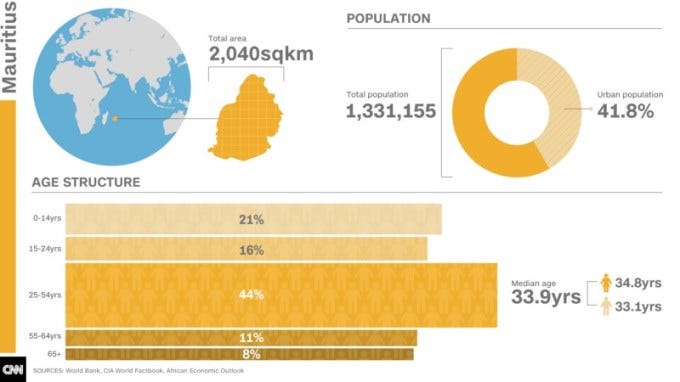Mauritius Launches A Year-Long Visa For Remote Workers
Interested in relocating to Mauritius, a tiny East African island with a population of roughly 1.3 million, the number one country in Africa in terms of ease of doing business and the number three country in Africa with the highest GDP per capita? This is probably the best time to give it a shot, especially if you are a remote worker. The country has just launched Premium Travel Visa policy for any non-citizen who intends to stay in Mauritius for a maximum period of one year as a tourist, retiree or a professional willing to come with his/her family and carry out his business or work remotely from Mauritius.

All the intended visitor has to present to show that they are qualified for the Premium Visa, is a proof of their long stay plans and sufficient travel and health insurance for the initial period of stay while meeting the following criteria:
- The applicants should not enter the Mauritius Labour Market;
- The main place of business and source of income and profits should be outside Mauritius;
- Documentary evidence to support application such as purpose of visit, accommodation etc.; and
- Other basic immigration requirements.
An online platform for the e-Visa application will be available shortly.
Before now, average stay under a Mauritian visa does not exceed 90 days within a 180-day period. At the same time, 60 nationalities are eligible for a 30-day visa on arrival, while other five can obtain a 15-day visa on arrival. Travelers eligible for a visa on arrival must provide a hotel booking confirmation, proof that they can financially sustain themselves for the entire time they are in Mauritius ($100 per day), and documentation (ticket, e-ticket) showing you will leave the country.

Mauritius Remote workers visa Mauritius Remote workers visa Mauritius Remote workers visa
Read also: Mauritius and Rwanda Ranked Top 50 In The World On The Ease of Doing Business
Many ‘Firsts’
As far as Africa goes, Mauritius has already racked up a number of African “firsts” in terms of international business achievements. These include Economic Freedom of the World (2017, Fraser Institute), Forbes Survey of Best Countries for Business (2017) and the Global Competitiveness Index (2017–2018).
It also secured first place in Africa and 25th position overall out of 190 countries on the World Bank’s Ease of Doing Business Report, receiving recognition in terms of its political, social and economic stability, efficient and effective regulatory framework, state-of-the-art infrastructure, transparent and innovative legal framework and its highly competitive tax system.
With a government focused on promoting foreign and domestic investment, it has enabled free repatriation of profits, no withholding tax on dividends, interest and royalties, no capital gains tax, and no estate duty, inheritance tax or gift tax. Plus it has 44 tax treaties with countries across the globe and another 32 in various stages of negotiation and ratification.
Mauritius is also known for its beaches and luxury resorts, but also offers hiking in its forested and mountainous interior and world-class diving and snorkeling offshore.
Charles Rapulu Udoh

Charles Rapulu Udoh is a Lagos-based lawyer who has advised startups across Africa on issues such as startup funding (Venture Capital, Debt financing, private equity, angel investing etc), taxation, strategies, etc. He also has special focus on the protection of business or brands’ intellectual property rights ( such as trademark, patent or design) across Africa and other foreign jurisdictions.
He is well versed on issues of ESG (sustainability), media and entertainment law, corporate finance and governance.
He is also an award-winning writer




